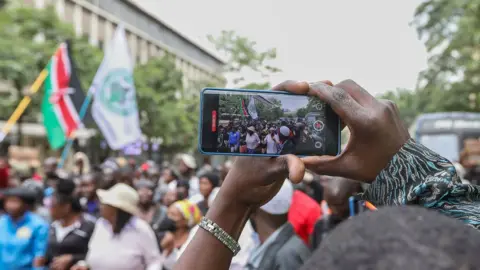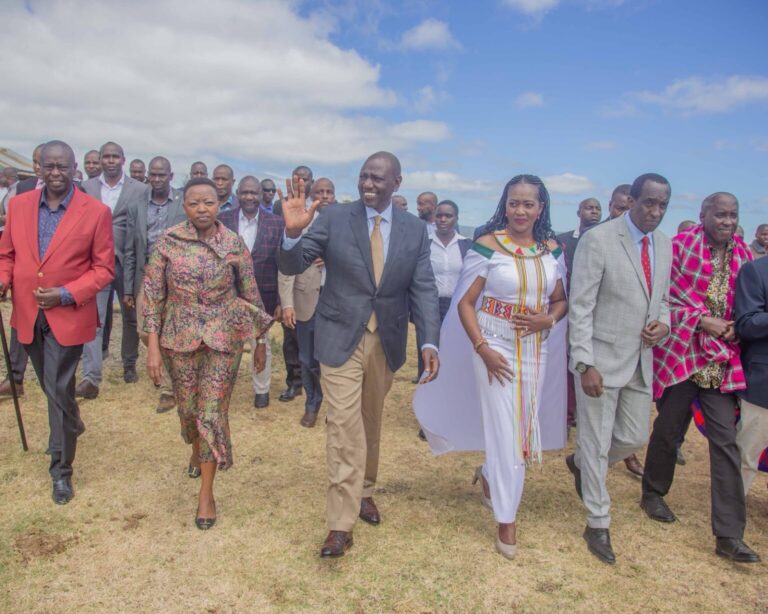In the Maa counties of Kajiado and Narok, a powerful new force is emerging in the political landscape—the Generation Z (Gen Z), known locally as the Nyangulo ageset. This generation, (born between 1995 and 1997), born during the internet age, has shown an unprecedented ability to organize, mobilize, and demand change, signaling a transformative era in Kenyan politics. Ignoring this demographic would be a perilous mistake for any leader aiming to navigate the political waters of the future.
For the first time since Kenya’s independence, a people-driven movement ignited largely by Gen Z took to the streets in droves to protest against the Finance Bill 2024. This bill threatened to introduce punitive taxes that would significantly raise the cost of living and doing business in Kenya. Additionally, it proposed allowing the state to raid the personal data of citizens, including bank details and mobile money accounts, thereby overturning existing digital privacy laws. The protestors gathered in Nairobi were not the usual hoi polloi who typically attend rallies; they were young people, including professionals from all classes.
This spontaneous, organic movement was significant in three important ways. Firstly, it was leaderless; there were no politicians or political leaders at the forefront, nor was it associated with any political party. Secondly, it was driven largely by social media; the call to protest was communicated mainly via platforms like X (formerly Twitter) and TikTok. This movement is akin to the Occupy Wall Street movement that took hold during Barack Obama’s presidency in the wake of the 2008 global financial crisis, the Arab Spring in North Africa, and the protests that resulted in the ouster of Sudanese president Omar al-Bashir in 2019.
The June 18th and 20th protests demonstrated that it is possible for Kenyans to rally around a cause without being chaperoned or persuaded by any political leader or politician. This is in sharp contrast to the early and mid-1990s when political leaders such as Martin Shikuku, Kenneth Matiba, and James Orengo could mobilize thousands of people to large pro-democracy rallies at Kamukunji grounds and other places, demanding an end to Daniel arap Moi’s dictatorial regime. For their efforts, some of these leaders were incarcerated, and it took another decade for Moi to be ousted. The resounding victory of Mwai Kibaki in the 2002 general election saw many of these leaders join the government or become elected leaders.
What happened then was that there was no one left to speak for “the people” except civil society and non-governmental organizations (CSOs and NGOs). During the Kibaki era, NGOs and CSOs also took on the role of educating the public about their rights and responsibilities when it was no longer dangerous to do so. The current political climate had raised questions: Had Kenyans reached a stage where they were willing to take up arms to fight for what they perceived to be their rights, or had the political class become more Machiavellian in creating ethnic divisions and entrenching a culture of violence and impunity?
Recent governments, including the so-called digital presidency of UhuRuto in 2013, underestimated the power of social media to bring about social, economic, and political transformation. Former President Uhuru believed that an army of propagandists and bloggers he recruited in State House could shield him from the people’s wrath, but this clearly did not happen, including in his own backyard in Central Kenya, which voted overwhelmingly for Ruto (whom he did not support in the 2022 election). Similarly, President Ruto believed that his communication team would help ensure his neoliberal, regressive agenda went unchallenged, whether citizens liked it or not. This has clearly not happened.
Ruto also believed that by cosying up to Western leaders (whom he vilified during his campaign to become deputy president before the 2013 election because he perceived them as supporting his indictment, along with Uhuru, at the International Criminal Court for crimes against humanity committed during the 2007/2008 crisis), he would be protected from scrutiny or criticism from Western nations and financial institutions such as the International Monetary Fund (IMF), which most Kenyans believe is the main architect of the draconian Finance Bill 2024. But even Ruto had to account for the millions of shillings he wasted traveling in a luxurious private jet to the United States for a recent state visit, even as he implored Kenyans to “tighten their belts” and prepare for tough austerity measures in the face of rising national debt. (The US embassy in Nairobi denied that the US had paid for the trip after Ruto suggested that it was paid for by the US government.) His belated explanation that the jet was a “gift” from friends also raised many questions about Kenya’s foreign policy. What “quid pro quo” arrangements were made with this foreign “friend,” and did this put Kenya’s national interests at risk? These questions may not have arisen if Kenyans on social and mainstream media had not demanded answers.
Enter Gen Z. This tech-savvy generation has shown us that Kenyans do not need mediators in the form of politicians or civil society organizations to speak on their behalf. They have demonstrated their ability to organize on a massive scale. After Nairobi, protests were planned in Mombasa, Eldoret, Kilifi, Laikipia, Nakuru, Kisumu, Meru, and Kericho, which means that the movement could soon become truly national—it has gone viral! They are the true patriots who will lead a people’s revolution that will bring about the change Kenyans desperately need.
A bold and new generation of young Kenyan protesters has emerged on the streets, forcing the government to back down on some of a slew of unpopular tax proposals. What started as anger on TikTok about a controversial finance bill has morphed into a revolt—without being organized by political parties. Armed with their smartphones, they live-streamed the intense confrontations with officers. They turned up in ripped jeans and stylish hairdos. The protests, dubbed “Occupy Parliament,” were coordinated and mobilized on social media in contrast to those led and sponsored by politicians. The youthful demonstrators, popularly referred to as Gen Zs, showed up in huge numbers, vowing to ensure that their discontent did not end with just a hashtag or meme.
As the protest lacked any clear leadership, the police found it hard to target those behind it. They banned the march on a technicality, though the protesters said all requirements had been met. Unlike previous political anti-government protests, it was not characterized by looting, destruction of property, and stone-throwing. No political affiliations or ethnic alignments were mentioned—just a clear determination by the protesters to be heard. Several hours after the demonstrators had mobilized, the presidency appeared to bow to the pressure and announced that it would scrap some of the bill’s most contentious provisions, including a proposed 16% value-added tax (VAT) on bread.
“We have listened to the view of Kenyans,” Kuria Kimani, the chairman of parliament’s finance committee, said at a press briefing attended by President Ruto and lawmakers in the ruling coalition. A few days ago, presidential adviser David Ndii had rudely dismissed online efforts that started on TikTok around two weeks ago, but following Tuesday’s show of strength, he acknowledged their achievement. Following the publication of the draft bill, TikTokers began making video explainers that were widely shared on other platforms like WhatsApp, Facebook, Instagram, and X—trending for days helped by pushes from Kenyan influencers. One tactic that has forced MPs to take notice is the list of their phone numbers that has been shared across social media with the message “SMS your MP.” MP Stephen Mule told local media that his phone was spammed with more than 30,000 messages from young Kenyans asking him to reject the bill. Other legislators have also complained that their phones have become practically unusable because of the number of texts they were receiving. Some urged veteran opposition leader Raila Odinga, who has been the face of anti-government protests for years, to stay away.
Prof Kivutha Kibwana, a law scholar and a former county governor, urged dialogue in his post on X: “The most dangerous thing for a government to do is to declare war on its youth.” Dr. Willy Mutunga, a former chief justice, said young people across the world had a common enemy in “their respective ruling classes,” warning: “The uprising is on the horizon.” The government has long held fears that social media could be used to promote discord and has pushed for stricter oversight by regulators. The online collective known as Kenyans on X (XOT) is renowned for calling out issues, and Kenya is among the countries with the highest TikTok usage rate worldwide. The #RejectFinanceBill demonstrations have showcased the power and influence of Generation Z. Across Kenya, young people have rallied together, harnessing the tools of the digital age to amplify their voices and effect change.
The energy and organization behind these protests reflect a new era of civic engagement, one driven by the tech-savvy, socially conscious, and outspoken Gen Z. Known for their proficiency with technology, Gen Z leveraged X, Instagram, and TikTok to share information, coordinate protests, and rally support. This unity is not just about rejecting the Bill but also about asserting their role in the democratic process and their right to shape policies that affect their lives. Gen Z’s capacity to mobilize quickly, use technology effectively, and sustain a unified and resilient movement is a powerful indicator of their potential to drive social and political change. As they continue to mature and take on more significant roles in society, their influence is likely to grow, shaping the future in ways that are just beginning to be understood. The #RejectFinanceBill demonstrations show that Gen Z is not just the future; they are a formidable force in the present.
In the Maasai community, the Gen Z of the Maasai community, particularly those within the Nyangulo ageset (ilayiok Loorkishili/ ilmejooli), are poised to play a pivotal role in the upcoming 2027 elections and beyond. This generation of Nyangulos has coalesced around a shared vision encapsulated in the phrases “Kitii Olgos” and “Etaa Ilmirisho Eingorita Inkishu,” emphasizing their readiness to assume leadership positions and drive meaningful change in their communities.
The rise of Gen Z within the Maasai community, particularly in Kajiado and Narok counties, marks a significant shift in local politics. Unlike previous generations, who often relied on established political structures and elders’ guidance, these young Nyangulos are harnessing their digital prowess and social media savvy to mobilize support and challenge existing norms. Their rejection of the Finance Bill 2024 and active participation in nationwide protests underscore their determination to influence policy and governance directly.
Leaders who fail to recognize the influence and aspirations of Gen Z within the Nyangulo ageset do so at their own peril. Already, figures like Katoo Ole Metito, a gubernatorial hopeful in Kajiado County for 2027, have acknowledged the importance of this demographic by promising significant roles in their administrations. Similarly, the youthful deputy governor candidate in Kajiado, Martin Moshisho has pledged key positions to tech-savvy Nyangulos, aligning with the community’s growing political aspirations.
In Kajiado County, legislators who supported the punitive Finance Bill faced stark criticism from the youth, contrasting with those who opposed it and received accolades for their alignment with Gen Z’s concerns. This dynamic highlights the shifting landscape where political support hinges increasingly on responsiveness to youth priorities and digital activism.
The following legislators in Kajiado County voted for the Finance Bill, thus drawing ire from the youth: Memusi Kanchory (Kajiado South MP), Leah Sankaire (Kajiado Central MP), Onesmus Ngongoyo (Kajiado North MP), and Hon. Sunkuyia (Kajiado West MP). In Narok County, similar dissatisfaction was expressed towards Rebecca Tonkei (Narok County MP), Kitilai Ole Ntutu (Narok South MP), Ken Aramat (Narok East MP), Gabriel Tongoyo (Narok West MP), and Hon. Johanna Ngeno (Emurua Dikirr MP), all of whom voted in favor of the bill.
Conversely, MPs who voted against the Finance Bill and garnered praise from the youth include Sakimpa Parashina (Kajiado South MP), Kakuta Maimai (Kajiado East MP), Naisula Lesuuda (Samburu West MP), and Julius Sunkuli (Kilgoris MP).
Looking forward, the influence of Gen Z within the Nyangulo community is set to grow exponentially. Their ability to organize, communicate, and mobilize through platforms like TikTok and XOT not only challenges traditional political paradigms but also signals a broader societal shift towards youth-driven leadership and accountability. As Gen Z matures and assumes greater roles in governance, their impact on shaping policies and political outcomes in Maasai counties and beyond will be pivotal, marking a new era of civic engagement and digital democracy in Kenya.







As young generation Z, the time is now to restore our democracy and dignity of Kenya.
No more blackmails and hand outs to the helpless youths, A vote for controversial finance Bill is a vote against 2027.